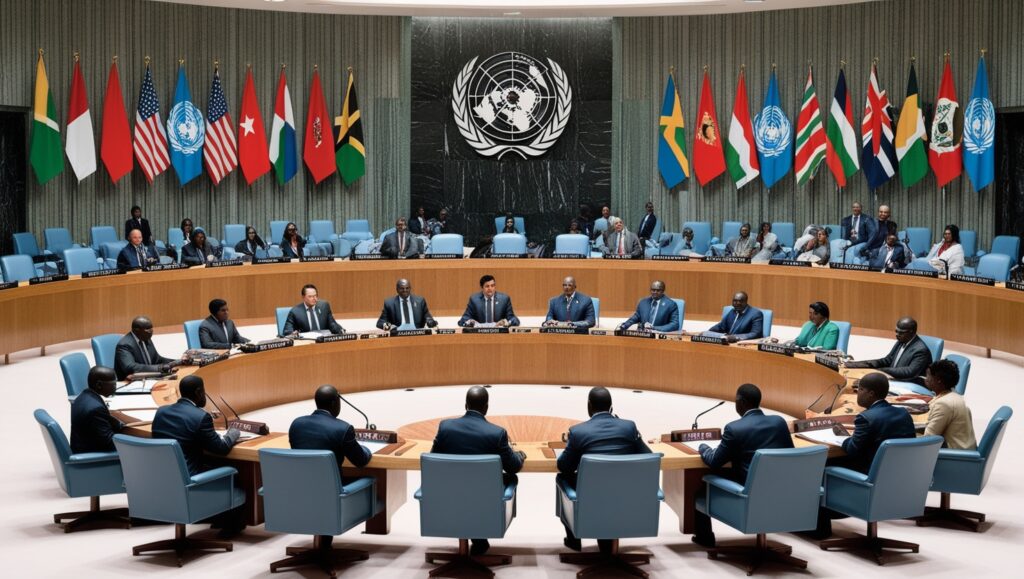Introduction:
The United Nations Security Council (UNSC) is increasingly seen as outdated and unfit to address modern global conflicts. Despite ongoing crises like the Russia-Ukraine war and tensions in Gaza, the UNSC remains inflexible, often stymied by its current structure. In light of growing demands for reform, the United States has recently proposed changes, including adding permanent members. But will these reforms genuinely make the UNSC more effective?
United Nations Security Council: A Body Stuck in Time
The UNSC, formed after World War II, was designed to maintain international peace and security. However, its structure—dominated by five permanent members (the US, UK, China, Russia, and France)—has rendered it inflexible. The power of veto held by these nations often leads to deadlock on critical global issues, such as the Syrian conflict, where geopolitical interests prevent decisive action.
Why the UNSC Needs Reform
- Outdated Representation: The five permanent members represent a world order that no longer exists. Emerging powers like India, Brazil, and African nations have no say in decisions affecting global peace.
- The Power of Veto: This tool, intended to prevent rash decisions, has instead become a weapon used to protect national interests, furthering gridlock and inefficiency.
- Failure to Address Global Conflicts: The UNSC has repeatedly failed to take meaningful action in recent conflicts, from the Arab Spring to the ongoing Gaza crisis, highlighting the urgent need for reform.
The US Proposal for UNSC Reform
Recently, the US put forth a proposal aimed at increasing the number of permanent members by adding two seats for African nations. The move is seen as a step toward increasing representation from regions like Africa, which historically have been underrepresented. However, the proposal does not include granting veto power to the new permanent members, raising concerns about whether these reforms will be substantial or merely symbolic.
Judge Drops Two Charges in Donald Trump’s Georgia Election Interference Case
What the US Proposal Includes
- Expanding Permanent Membership: The US suggests increasing the number of permanent seats from five to seven, with two additional seats allocated to African nations.
- No Veto Power for New Members: The most controversial aspect of this proposal is that these new members will not be granted veto power, which raises questions about their actual influence on global decisions.
The Implications of Adding African Nations to the UNSC
Africa is home to many of the world’s most pressing issues, including poverty, terrorism, and border conflicts. However, African nations remain severely underrepresented in international decision-making bodies like the UNSC.
Why Representation Matters
- Africa’s Global Role: As the continent with the most ongoing conflicts, Africa’s inclusion in UNSC decisions is crucial for addressing terrorism, water disputes, and political instability.
- Increased Legitimacy: Including African nations in the UNSC will give the body greater legitimacy and make it more reflective of today’s global power dynamics.
However, without veto power, the question remains: will these new seats truly bring about change, or will they serve as token gestures without real impact?
The Veto Power Debate: Why It’s Critical
The core issue of UNSC reform is the veto power. Currently, the five permanent members can veto any resolution, effectively blocking any action they oppose, regardless of global consensus. India, Brazil, and other emerging powers have long argued that permanent membership without veto power is meaningless.
The Role of Veto in Global Politics
- India’s Case for Veto Power: As a rising power and one of the world’s largest democracies, India argues that veto power would allow it to safeguard its national interests, much like the current permanent members.
- The Dilemma for the US and Allies: Granting veto power to new members could weaken the influence of existing permanent members, particularly the US and its allies, who have relied on the veto to protect their interests.
The Broader Geopolitical Impact
The US proposal for UNSC reform reflects the shifting geopolitical landscape. While it acknowledges the need for change, it also seeks to protect the current power dynamics. For example, India, a close ally of Russia, has not been included in the proposal, likely due to concerns over its potential alignment with Russian interests.
Conclusion: Will Real Reform Happen?
The US proposal for UNSC reform is a step in the right direction, but it falls short of addressing the core issues—namely, the power imbalance created by the veto system. While expanding the council to include African nations is commendable, real change will only come when new permanent members are granted equal powers, including the veto. Without this, the UNSC risks remaining a body that is more symbolic than effective.

